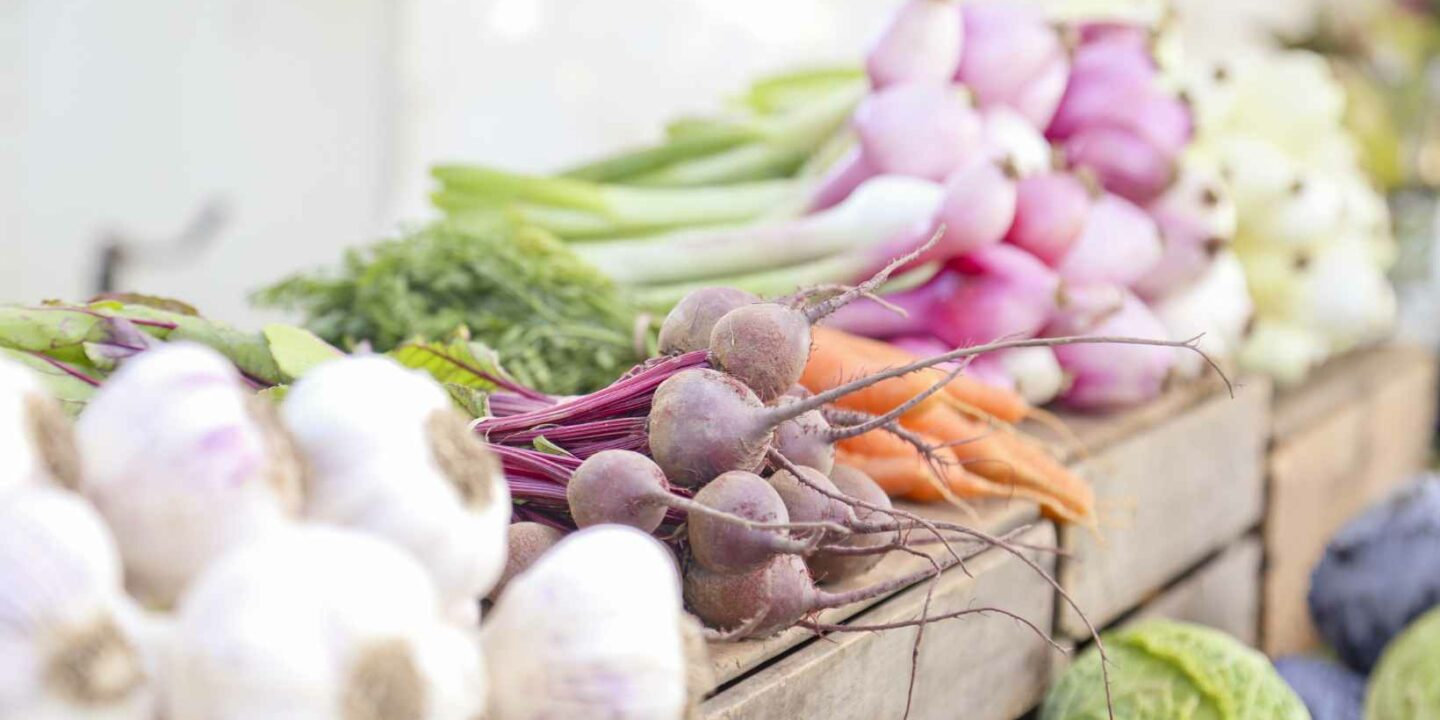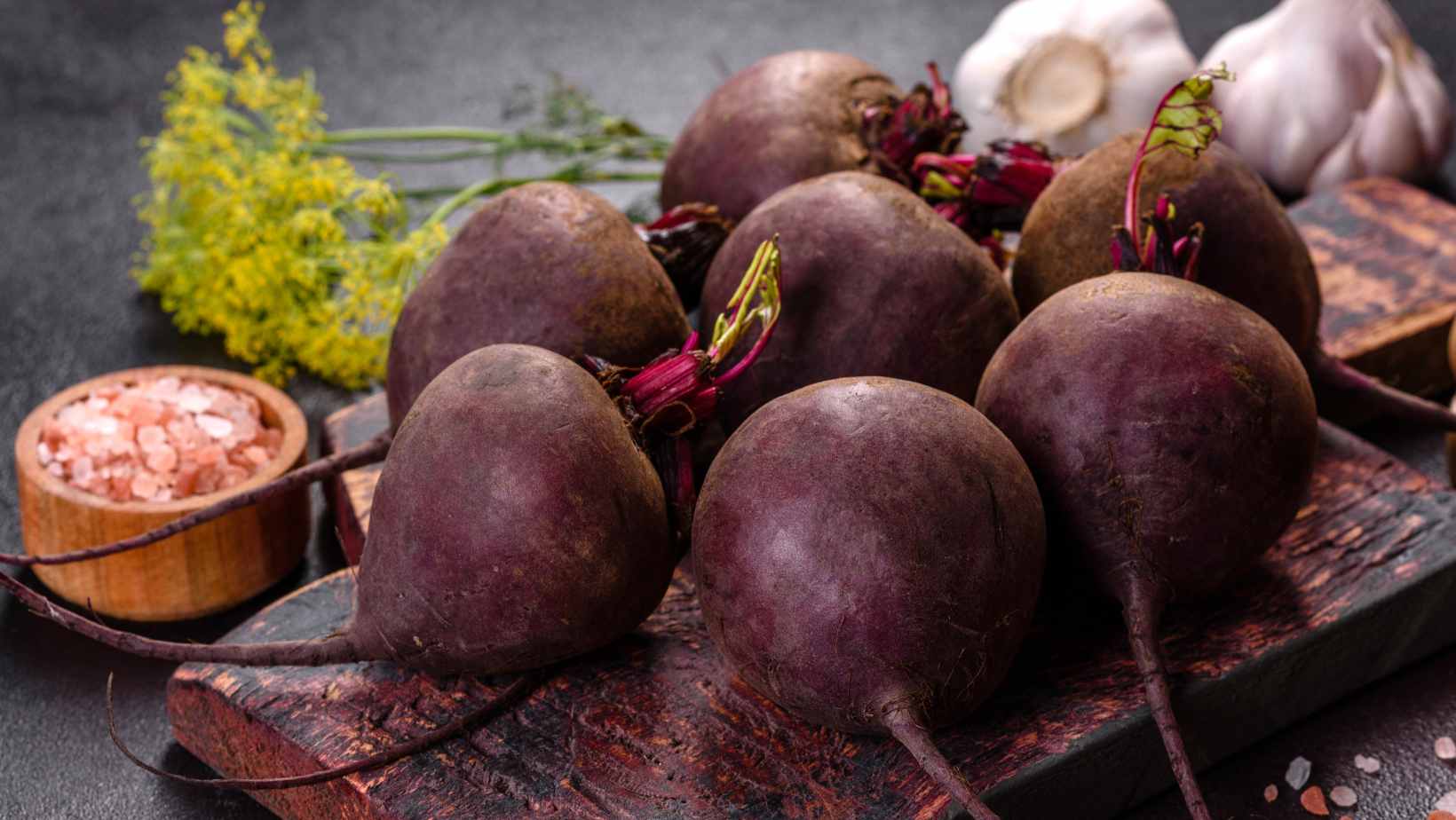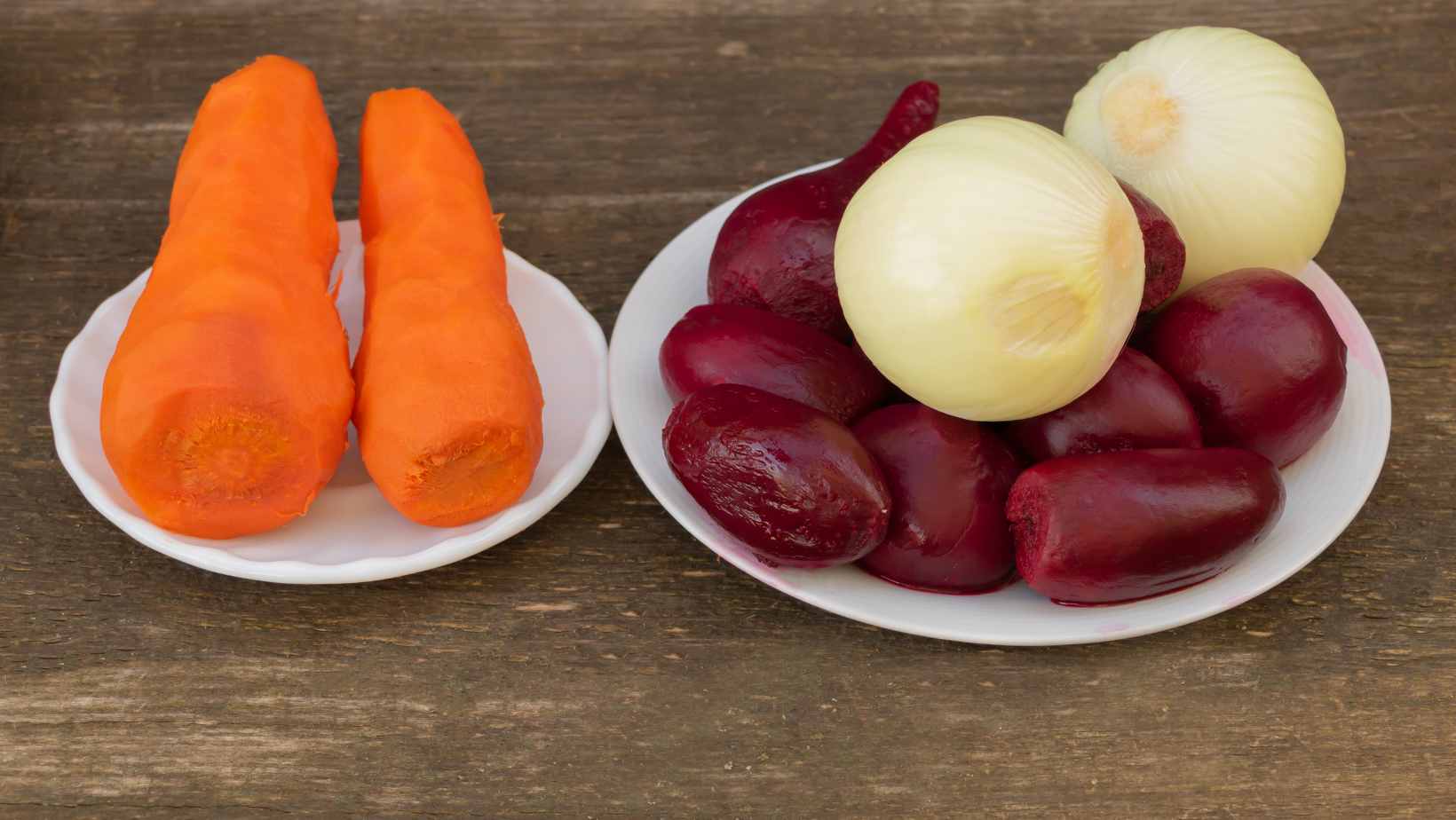
Beets are a versatile and nutrient-dense root vegetable that have been valued for their many health benefits for centuries. From promoting healthy digestion to boosting athletic performance, the benefits of beets are numerous and varied. Rich in essential vitamins, minerals, and antioxidants, beets have been shown to lower blood pressure, improve heart health, and even boost brain function. Additionally, beets are low in calories and high in fiber, making them an ideal food for weight management. Overall, incorporating beets into your diet can provide a wide range of health benefits that can help you feel your best.
Furthermore, beets are also known for their ability to reduce inflammation in the body. This is due to their high content of betalain pigments which have been shown to have anti-inflammatory properties. In addition to reducing inflammation, these pigments may also help protect against certain types of cancer by preventing oxidative damage to cells.
Moreover, beets have also been found to enhance athletic performance by improving oxygen utilization and reducing fatigue during exercise. This is largely due to their high nitrate content which gets converted into nitric oxide in the body – a molecule that helps dilate blood vessels and increase blood flow to muscles.
In summary, adding beets to your diet can provide a host of health benefits such as reducing inflammation, protecting against cancer, improving athletic performance and promoting heart health among other things. To incorporate more beets into your diet try roasting them with some olive oil and seasoning or juicing them for a quick nutrient-packed beverage. Move over, Popeye – beets are the new muscle food.
Nutritional benefits of beets
To understand the nutritional benefits of beets, including their rich source of vitamins and minerals, high fiber, and low-calorie content, as well as their potent antioxidant and anti-inflammatory properties. This section will explore these benefits in detail, with each sub-section focusing on one key aspect of beets’ nutritional value.
High in fiber and low in calories
Beets are a superfood that offers unique health benefits. They are notable for their high fiber and low-calorie content, making them an excellent addition to any healthy eating plan.
- One of the primary benefits of beets is their high fiber content. Fiber plays a key role in digestive health and can help prevent constipation, reduce inflammation in the gut, and lower cholesterol levels.
- With just 35 calories per 1/2 cup serving (cooked), beets are an excellent food for weight management. The low-calorie content makes them perfect for snacking or adding to meals without worrying about exceeding daily calorie limits.
- Beets also contain essential vitamins and minerals, including potassium, magnesium, vitamin C, iron, and folate.
In addition to these benefits, beets have also been shown to improve athletic performance. Studies suggest that the nitrate in beet juice can enhance oxygen flow to muscles during exercise – ultimately leading to increased endurance.
A study by the University of Exeter discovered that drinking beetroot juice could increase stamina by up to 16%. Forget supplements, just eat some beets and you’ll be getting more vitamins and minerals than a health store could ever offer.
Rich in vitamins and minerals
Beets are a powerhouse of nutrients with high content of essential vitamins and minerals. Their consumption has several health benefits, which makes them one of the most popular root vegetables worldwide.
- Beets are an excellent source of Vitamin C that boosts immunity and protects against diseases.
- They have also been found to contain significant amounts of essential minerals such as potassium, magnesium, phosphorus, iron, and zinc that promote various physiological functions in the body.
- Their high folate content is incredibly beneficial for pregnant women and can reduce the risk of birth defects in newborns.
Furthermore, beets also contain nitrates that help improve exercise performance by reducing oxygen intake. They are also known to lower blood pressure levels in individuals with hypertension.
Adding beets to your diet is a great way to enhance overall wellbeing and prevent chronic illnesses. Incorporating beetroot juice or roasted beetroots salads regularly into your diet plan can go a long way in promoting optimal health. Boiling or steaming beetroot preserves its nutritional value while minimizing any nutrient loss.
Good news for those who hate beet-ing inflammation: these ruby roots pack a punch of antioxidants and anti-inflammatory properties!
Contains antioxidants and anti-inflammatory properties
Beets are a hub for nutrients and bioactive compounds that promote health in a variety of ways. They boast of properties that neutralize free radicals and reduce inflammation, leading to numerous health benefits. Here are four points on how beets’ antioxidants and anti-inflammatory properties work:
- 1. Beetroots are rich in betalains, which includes betanin and vulgaxanthin. These compounds exhibit antioxidant and anti-inflammatory activity that helps reduce oxidative stress in the body.
- 2. Beets have high levels of vitamin C, a well-known antioxidant that scavenges free radicals and protects cells from oxidative damage.
- 3. Dietary nitrates present in beets help improve blood flow by lowering blood pressure and relaxing blood vessels’ walls.
- Lastly, beetroots are also an excellent source of fiber, which has been associated with lower inflammation levels and overall better health outcomes.
Moreover, studies show that beetroot juice consumption can enhance exercise performance by improving oxygen delivery to muscles. Additionally, research suggests its use in treating liver disease owing to their antioxidative capacity.
According to history, beetroot has its origins traced back to ancient Rome’s era when it was cultivated for medicinal purposes rather than food consumption. Beetroots have since gained popularity all over the world due to their nutritional value.
Beets may be messy to prepare, but their health benefits are worth the colorful stains on your hands.

Health benefits of beets
To reap the health benefits of beets, delve into the section on health benefits of beets with a focus on how they can improve your overall wellbeing. Discover the various sub-sections, including may lower blood pressure, may improve athletic performance, may enhance brain function, may improve digestive health, and may reduce the risk of chronic diseases, which will highlight the benefits of incorporating beets into your diet.
May lower blood pressure
Beetroot may provide potential health benefits by reducing blood pressure:
- It contains nitrates that can convert into nitric oxide in the body, promoting vasodilation and ultimately lower BP.
- Betalains in beets can reduce oxidative stress, inflammation, and improve cardiovascular function.
- Lastly, beetroot juice consumption has demonstrated a significant reduction in systolic and diastolic blood pressures.
Other than lowering BP, beetroot is also rich in vitamins and minerals including folate that contributes to DNA synthesis and repair. Therefore, incorporating beets into a balanced diet could provide numerous health benefits.
Pro Tip: Adding roasted beets to salads or smoothie bowls can amplify its nutritious value to levels above its raw state.
Move over spinach, beets might just be the new Popeye’s secret weapon for super strength on the track.
May improve athletic performance
Improved physical performance is among the remarkable advantages of incorporating beets into your diet. With its high nitrate content, it can enhance endurance and muscle efficiency during exercise or any physical activity.
- Beetroot juice consumption before physical activities lowers oxygen consumption for a given workload.
- The nitrates in beetroots reduce blood pressure and oxygen requirements while increasing blood flow and nutrient delivery to muscles.
- The anti-inflammatory properties of beetroot extract help reduce muscle damage that occurs during high-intensity routines like HIIT and weightlifting.
- Beetroot also helps with quick recovery after intense workouts because it reduces fatigue and soreness associated with training loss
- Research indicates that drinking a single serving of beet juice (or consuming other sources of dietary nitrates) may enhance endurance and increase exercise capacity by up to 25%.
Interestingly, the boost in athletic performance is not just limited to athletes. Eating beets or drinking beet juice can even offer an excellent advantage for those who struggle with cardiovascular complications caused by sedentary lives.
To experience the benefits mentioned above, adding one medium-sized cooked beet per day to your diet is recommended.
Don’t miss out on the opportunity of improving your athletic ability through this humble vegetable. Incorporate beets into your meals today!
Beets may not make you a genius, but they could help sharpen your brain and make you beet the competition.
May enhance brain function
Consuming beets may have positive effects on cognitive abilities. Research suggests that the high nitrate content in beets improves blood and oxygen flow to the brain, leading to better brain function. Additionally, beets contain betaine and folate which help reduce inflammation and improve mental health.
Moreover, studies demonstrate that regular beet consumption can enhance decision-making skills and memory retention. The antioxidants in beets also protect against neurodegenerative diseases like Alzheimer’s. Incorporating beets into your daily diet can not only improve your physical health but also support your cognitive abilities.
Pro Tip: To maximize the benefits of beets, try roasting or juicing them instead of boiling or steaming which can deplete their nutrients.
Beets: Because who needs a happy gut when you can have a ruby red one?
May improve digestive health
Beets may assist in enhancing digestive health due to their high fibre content and nitrate compounds. This may help decrease inflammation, regulate bowel movements, and lead to a healthier gut microbiome. Additionally, the potassium content assists in maintaining a healthy fluid balance within the body. Beets also promote digestion by encouraging bile production and are commonly used to treat constipation. Moreover, consuming fermented beet juice can increase beneficial bacteria in the gut, resulting in better nutrient absorption and a stronger immune system.
Ingesting moderate amounts of beets has been proven effective in detoxifying the liver by flushing out toxins and promoting bile flow. This leads to improved digestion as well as overall liver function. Furthermore, consuming beetroot before meals has shown to help prevent acid reflux by reducing inflammation in the oesophagus.
To reap the digestive benefits of beets, try incorporating them into your diet raw or cooked. Roasting or steaming is recommended for best results. Drinking beet juice or incorporating beet powder into smoothies is another effective method for consuming this superfood. Consuming fermented beet juice or pickled beets is recommended for optimal gut health.
In summary, incorporating beets into your diet can offer numerous benefits including improving digestive health through regulating bowel movements, reducing inflammation, and promoting healthy gut bacteria. Furthermore, consuming beets can detoxify the liver while preventing acid reflux-symptoms when taken before meals.
Beets: the ultimate insurance policy against chronic diseases or the ultimate prank on your taste buds? You decide.
May reduce the risk of chronic diseases
Beets are a highly nutritious vegetable that possess properties which may reduce the likelihood of chronic medical conditions. Here are some benefits:
- May improve blood pressure and circulation due to nitrates
- Antioxidants in beets may help combat inflammation and oxidative stress linked to certain cancers
- Fiber in beetroot supports digestive health and weight management
- Rich in folate, a B-vitamin known for supporting fetal development and reducing birth defects
- Nitrates also support cognitive function by increasing blood flow to the brain
It is significant to note that consuming excessive amounts of beetroot may cause temporary urine discoloration or gastrointestinal disturbance. Nonetheless, incorporating moderate amounts of beets in one’s diet provides numerous health benefits.
Scientists are still researching whether or not beet juice can help regulate glucose levels, but the most recent studies have been promising. It is believed that it can improve sensitivity to insulin, resulting in better glycemic control.
While at the grocery store recently, a woman shared how she squeals with excitement when discovering fresh produce because her mother taught her better nutrition starts with colorful fruits and veggies like beets. She explained adding steamed beets to salads adds pizzazz while also improving overall wellness.
Beets may turn your urine red, but don’t worry – it’s just your body’s way of saying ‘I love beets!’
Potential side effects of consuming beets
To avoid potential side effects of consuming beets, as they are an excellent source of nutrients, you need to be aware of the risks that come along. Increases in urine output and temporary discoloration, digestive discomfort and allergic reactions, and interference with certain medications are some of the sub-sections to be considered while consuming beets.
Increases urine output and may cause temporary discoloration
Beet consumption may lead to increased urine output and temporary discoloration.
- Urinating more often than usual is an expected result of consuming beets due to the high amounts of nitrates that get converted into nitric oxide, increasing blood flow and potentially lowering blood pressure.
- The red pigmentation in beets commonly tints urine a pinkish or reddish hue after ingestion, which typically subsides within 24-48 hours.
- Individual variability can influence the degree of discoloration, with some showing more profound changes than others
- This side effect is not considered harmful but can cause concern or confusion for those unaware of it.
- If symptoms like abdominal pain or discomfort accompany red-colored urine, medical advice should be sought as soon as possible
- Certain medications including warfarin and ibuprofen might accentuate this phenomenon by thinning blood or altering kidney function
Apart from discoloration, beet juice can also possibly trigger gastrointestinal problems like cramping if taken in excess or interaction with antacids, H2 blockers, proton pump inhibitors, and certain antibiotics.
Without appropriate health warning regarding such complications, a close friend recounted how unnerving her first experience with BEETRx powder was at the gym one Sunday afternoon. The following day she was self-diagnosed with mild food poisoning but later found out that her excessive beetroot consumption was breeding all sorts of unexpected urination chaos a la pink pee panic.
Eating beets may not only give you a stomachache, but also turn you into a walking allergy alert.
May cause digestive discomfort and allergic reactions
Digestive Discomfort and Allergic Reactions Caused by Beet Consumption
Beets are a nutritious vegetable often consumed for their beneficial properties. However, they may also lead to digestive discomfort and allergic reactions in some individuals.
- Consuming beets can cause abdominal pain, bloating, diarrhea, and gas. This is because beets contain high amounts of fiber that can be difficult to digest.
- In rare cases, consuming beets can also cause an allergic reaction. Symptoms may include itching, hives, swelling of the face or tongue, and difficulty breathing.
- Beet juice is particularly known for causing digestive discomfort due to its concentration of fiber and natural sugars.
- Individuals with a history of oxalate kidney stones should also exercise caution when consuming beetroots as they contain high levels of oxalates which can contribute to the formation of these types of kidney stones.
- Cooking the beets may help to reduce their concentration of oxalates and make them more easily digestible for those with sensitive stomachs.
Moreover, it’s essential to note that beet consumption does not affect everyone equally. Some individuals may experience no side effects while others may have severe reactions.
If you’re considering adding beets to your diet or already consume them regularly, it’s crucial to monitor how your body reacts. If you notice any adverse effects such as digestive discomfort or allergy symptoms, it’s best to speak with a healthcare provider regarding modification or avoidance in your diet.
Don’t miss out on the benefits of beets; monitor your body’s response and take necessary precautions when incorporating them into your meals.
If you’re taking medication and considering a beet salad, just remember: red urine might be the least of your worries.
Interferes with certain medications
Certain drugs may interact with the compounds found in beets, potentially leading to harmful side effects. Beets contain high amounts of nitrates, which can cause a decrease in blood pressure. This effect can be dangerous when combined with medications used for treating hypertension or erectile dysfunction. Other medications, such as antibiotics and antiplatelet agents, may also interact negatively with beet consumption.
Moreover, individuals taking medication for anemia should also exercise caution while consuming beetroot due to its high iron content. Excessive consumption may lead to iron overload and other complications in these individuals.
Pro Tip: Discuss any concerns about potential interactions between medications and beets with your healthcare provider before including this vegetable in your diet.
Get your daily dose of iron and a side of earthy dirt flavor with these easy ways to incorporate beets into your diet:

How to incorporate beets into your diet
To incorporate beets into your diet with their numerous benefits, try roasting or grilling them for a flavorful side dish. Add them to your salads or smoothies for a nutrient boost or opt for beet juice for a quick and easy option. You can also use beet powder as a supplement for its potent benefits.
Roasting or grilling beets
Using a Combination of Heat to Cook Beets
Cooking beets can be done through various methods, but one approach that yields optimal results is by roasting or grilling them. These procedures allow the root vegetable to develop flavors and textures that cater to diverse culinary preferences.
Step-by-Step Guide on Roasting or Grilling Beets
- Preheat your oven or grill: Ensure that your oven or grill is heated between 375°F to 400°F (190°C up to 204°C).
- Clean your beets: Scrub the beetroots under running water with a brush until all dirt and debris are removed.
- Add flavorings if desired: Place the cleaned beets on aluminum foil, drizzle some olive oil, salt, pepper, and other herbs depending on preference.
Unique Details About Roasting or Grilling Beets
Roasting or grilling beets alter their texture, making them soft with crunchy exteriors. Adding garlic cloves and rosemary will add extra aroma to their natural sweet flavor.
True Story About Incorporating Beets in Your Diet
According to Chef Mary Mattern’s story, her love for roasted beet hummus began when she was trying to impress her friends during a potluck party. After realizing how quick and easy it was to prepare, it became a staple snack item she enjoyed at home while incorporating health benefits into her diet effortlessly.
Who needs a kale smoothie when you can have a vibrant beet smoothie that will give your insides a good ‘beeting’?
Adding beets to smoothies or salads
Beetroot is a powerful superfood that can be easily incorporated into your diet. If you are looking for ways to add beets to smoothies or salads, here are some tips.
- Start by washing and peeling the beetroot.
- Cut them into small pieces before adding to your smoothie.
- If you are adding it to a salad, slice the beetroot thinly using a mandoline slicer.
- Add it raw or roast it lightly with some olive oil, salt, and pepper for added flavor.
- You can also blend cooked beetroot with other ingredients like avocado, banana, or spinach to make a nutritious smoothie.
- Combine beetroot with other raw vegetables like carrots and cucumbers for an even healthier salad.
It’s important to note that beetroot has an earthy taste that may not appeal to everyone. However, by combining it with sweet fruits like apples or oranges in your smoothie or balancing out its flavor with tangy ingredients like lemon juice in your salad dressing, you can make it more palatable.
Another important thing to keep in mind is that beetroot stains everything it comes into contact with. So be sure to handle it carefully and wear gloves if necessary.
Incorporating beets into your diet can help improve blood pressure levels and boost overall health. A friend of mine who started eating beets regularly shared how her energy levels have increased significantly since then. Give it a try and see the difference for yourself!
Drinking beet juice is like chugging a glass of pure irony: it’s sweet, yet earthy, and leaves a stain you can’t hide.
Are beets acidic
Beetroot juice is a healthy and natural way to include beets in your diet. Here are six reasons why drinking beet juice is beneficial for your overall health:
- 1. It can improve blood pressure and circulation.
- 2. It may enhance athletic performance and endurance.
- 3. It has anti-inflammatory properties that can reduce the risk of chronic diseases.
- 4. It contains essential vitamins and minerals like Vitamin C, potassium, iron, magnesium, and folate.
- 5. It aids digestion and improves gut health.
- 6. It can boost your immune system and increase energy levels naturally.
Incorporating beet juice into your daily diet not only provides numerous health benefits, but it also tastes delicious when combined with other fruits and vegetables in smoothies or simply as a standalone drink.
It’s no surprise that beet juice has garnered so much attention in recent years – why miss out on such a tasty yet nutritious drink? Try adding beet juice to your daily routine today!Who needs protein shakes when you can power up with beet powder? Your muscles will thank you, and you won’t have to choke down any more chalky drinks.
Using beet powder as a supplement
If you are looking for a way to add more nutrients to your diet, beet powder is a great option. This supplement can provide numerous health benefits.
- Provides a source of nitrates, which can help improve blood flow and reduce blood pressure.
- May enhance exercise performance by improving oxygen uptake in the body.
- Contains potent antioxidants that can protect cells from damage and inflammation.
Ingesting beet powder regularly may also aid in liver detoxification and support cognitive function. Overall, incorporating beet powder into your daily routine can be an easy and effective way to boost your overall health.
When using beet powder as a supplement, it’s essential to start with small doses and gradually increase over time. It’s best taken on an empty stomach or before meals for the best absorption. Also, make sure to choose a high-quality product from a reputable source.
To incorporate it into your diet, mix it into smoothies, juices, or even baked goods like muffins or pancakes. The possibilities are endless! Adding some lemon juice alongside may also enhance its benefits due to the added vitamin C content.
By consistently incorporating beet powder into your routine in various ways, you’ll reap the benefits of this nutrient-dense supplement.
Even if you hate beets, after reading this article you’ll be rooting for them.
